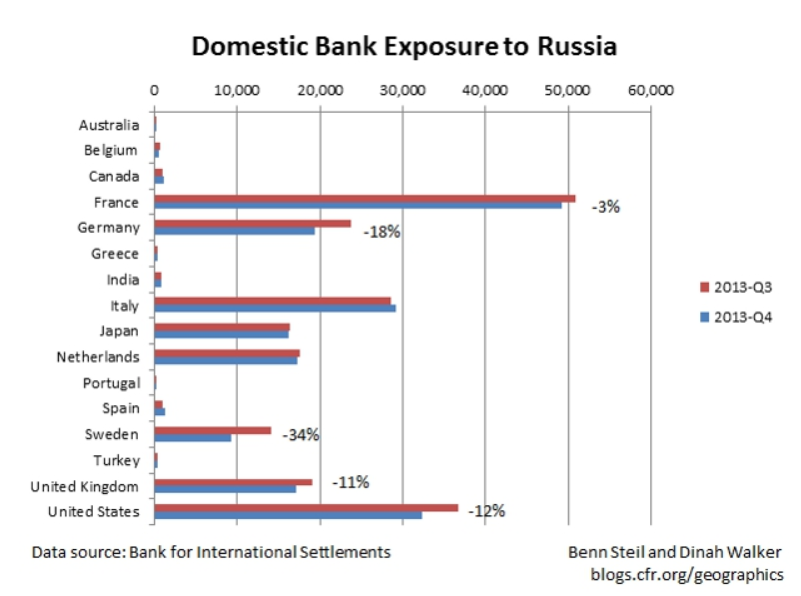This Great Graphic was posted by Benn Steil and Dinah Walker from the Council on Foreign Relations. It shows numerous countries' bank exposures to Russia. It is based on data from the Bank for International Settlements.
Steil and Walker's point is that while the US, German, UK, and Swedish banks cut back on exposure to Russia in Q4 2013, French banks did not very much. France's $50 bln is by far the greatest exposure. Moreover, they note that a good part of France's exposure is illiquid as it is in the form of Soc Gen's ownership stake of Russia's 9th largest bank Rosbank, worth about $22 bln. Steil and Walker muse that maybe US money markets and other investors should re-evaluate their exposures to French banks.
This may be a good place to begin, but not to finish. The situation is more complicated. For example, noticeable by its absence from the Steil/Walker chart and discussion is Austria. Austria banks have relied on expansion to eastern and central Europe, including Russia. Fitch argues that Austrian banks, not French bank are most exposed to Russia. The primary channel is their local subsidiaries.
For Europe as a whole Fitch estimates that almost 2/3 of the bank claims are from their Russian subsidiaries. It notes that recent developments may pressures the earnings of these Russian operations, but they are typically funded locally. Fitch estimates that about $8 bln is funded cross border by the foreign parent banks. It acknowledges that as the sanctions tighten and liquidity slackens, such funding may increase, yet it sees slower economic growth and weakness of the rouble pose more immediate challenges.
Fitch's data suggest that Austrian banks have the greatest exposure relative to equity. Raiffeisen Bank International's exposure to Russia is about 20 bln euros, which is 2.2x Fitch's measure of its core capital. Three-quarters stem from its Russian subsidiary,and the remainder is cross board exposure. Separately, its attempt to sell its Ukraine subsidiary had to be shelved. Raiffeisen's combined Russia/Ukraine exposure is 2.8X Fitch's measure of its core capital. Fitch notes that Russia accounted for a fifth of the bank's earnings and three quarters of its (pre-tax) profits last year.
Another Austrian bank that Fitch discusses is UniCredit Bank Austria, whose exposure is 1.2x the rating agency's calculation of its core capital. It also has a Russian subsidiary. However, Fitch notes that the ultimate risk falls back to Italy's UniCredit. Italy's overall bank claims on Russia are estimated around $30 bln, the majority of which Ftich says are in-country exposures.
Turning to France, Fitch estimates that about $30 bln of its $50 bln exposure relates to French bank subsidiaries. Cross-border lending is considerably smaller. The rating agency puts more emphasis on the 14 bln euros, for example, of retail loan exposures of Soc Gen through is Russian-based subsidiary Rosbank and its affiliates, to be quite modest at 43$ of its calculation of the bank's core capital. Other large French banks, like BNP Paribas and Credit Agricole reportedly have small subsidiaries in Russia.
US banks have about $37 bln of direct claims on Russia. Citigroup has a Russian subsidiary, which has about $10 bln in assets. Fitch estimates this is less than 10% of its calculation of Citi's core capital. Fitch acknowledges that there may be other claims, such as guarantees and derivatives that are not picked up in this data. Overall, Fitch expects these to be relatively small compared with assets.

